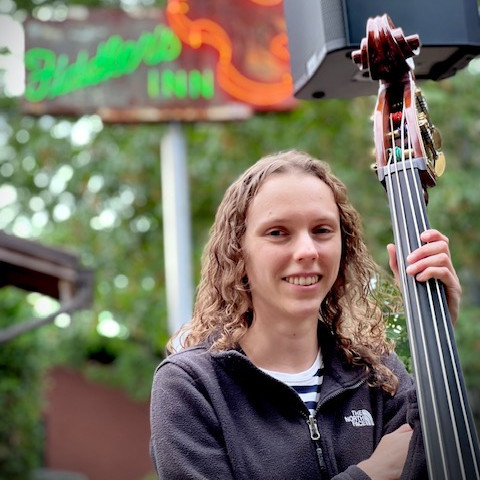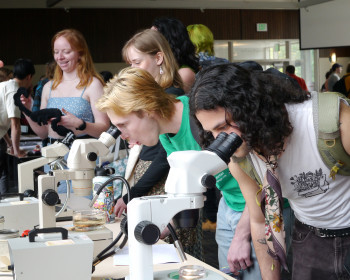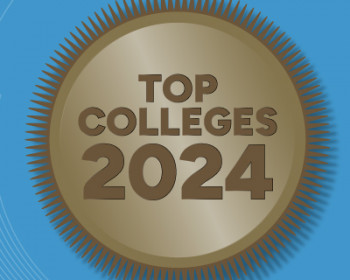RuthMabel Boytz
L&C as a whole encourages students to engage in multiple interests, and the small class sizes enable students to learn directly from professors.

Pronouns
Degree and Class Year
Hometown
Current City
Major
Minor
Extracurriculars
Job Title, Organization
Continuing Studies
What three words would you use to describe L&C?
What made you want to come to Lewis & Clark?
I wanted a college where I could pursue biology and music; where I would have the opportunity to do original research and work closely with professors; and a community of outdoor enthusiasts. L&C as a whole encourages students to engage in multiple interests, and individual professors were supportive of me doing this as well. The small class sizes enable students to learn directly from professors, and the faculty labs and Rogers Summer Research Program provide opportunities for students to perform original research. Through College Outdoors, I was able to regularly get out of the city and meet fellow hiking and skiing enthusiasts. Lastly, I loved the people at L&C that I met during a campus visit.
What have you been doing since graduation?
For two years I was a research technician in a virology lab at the National Emerging Infectious Diseases Labs in Boston. In the fall of 2022, I started a PhD program in microbiology at Yale University, where my research focuses on interactions between viruses and their hosts.
How did Lewis & Clark prepare you for your PhD program?
L&C taught me how to critically assess and synthesize information from diverse sources and to apply my understanding to new situations. This initiated my development as a scientist and prepared me for graduate science courses. L&C’s emphasis on developing writing skills made me a strong candidate for my research tech position and set me apart when writing applications for PhD programs.
What would you say is the most important thing you learned at Lewis & Clark?
The most important thing I learned at L&C was that I shouldn’t let a challenging course or other situation prevent me from trying it anyway. If it looks interesting, if I think I will learn something, then I shouldn’t let the fear of not doing it perfectly stop me from giving it a go.
Why did you major in biology?
I was interested in microbes since middle school, and I wanted to learn more details about how they live and where they came from. Majoring in biology was the best way to learn facts and develop skills to ask my own questions about these bacteria and viruses.
Why did you minor in mathematics?
Biology requires math, and I wanted to better understand how scientists develop models and biological systems and why we use certain statistical methods in our research.
How do you stay connected to Lewis & Clark as an alum?
I still email and Zoom with my research mentor, Dr. Sharon Torigoe. I follow L&C Instagram accounts to keep up-to-date on college events and sports teams.
What was your favorite class? How did it expand your knowledge?
Cell Biology with Professor Greg Hermann in my junior year. I learned how scientists think through problems and how they make decisions about experimental designs to answer specific questions. I gained a new understanding of what the scientific method is and why each part plays a specific role in creating new knowledge.
Where did you find your community on campus?
Through orchestra and jazz combos I met fellow musicians who became a community outside of academics. I also found a community through my biology courses.
Who was your mentor on campus? Why do you consider this person your mentor?
Dr. Sharon Torigoe. I did research with her for about two years. She taught me techniques, procedures, presentation and writing skills, and challenged me to take risks. When I began applying for graduate school, she helped me think about what I wanted in a PhD program and supported me as I wrote countless personal statements.
More Admissions Stories
Admissions is located in Frank Manor House on the Undergraduate Campus.
MSC: 32
email admissions@lclark.edu
voice 503-768-7040
fax 503-768-7055
Vice President of Admissions and Financial Aid
Eric Staab
Admissions
Lewis & Clark
615 S. Palatine Hill Road MSC 32
Portland OR 97219

